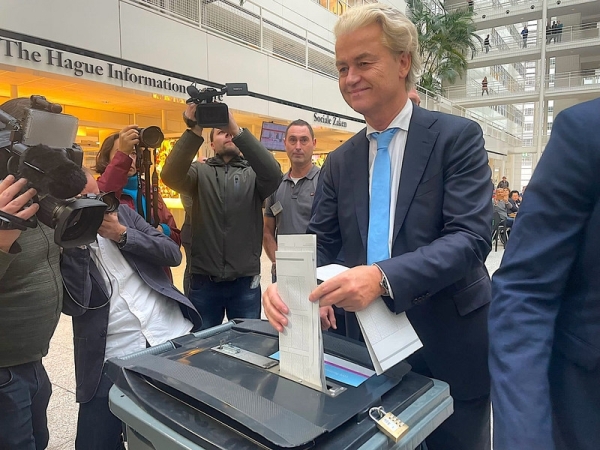Far-right anti-Islam Wilders wins Dutch election
With 98 percent of the votes tallied, Geert Wilders, the far-right anti-Islam leader in the Netherlands, has resoundingly defeated his opponents.
On Thursday morning (23 November), polls showed Wilders had won 37 seats, followed at a distance by the Green-Labour coalition led by former EU heavyweight Frans Timmermans at 25 seats and the Liberal VVD with 24 seats.
Dilan Yeşilgöz — caretaker prime minister Mark Rutte’s successor as VVD leader — had attempted to steal rightwing votes away from Wilders with a hardline migration agenda. But this backfired, with voters opting for "the original" anti-migrant Freedom Party Wilders (PVV) founded in 2006, as one commentator said on Dutch television on Wednesday night.
Wilders, who has been described as the Dutch Donald Trump, has previously been found guilty of inciting discrimination for his anti-Moroccan chants. But following 11 years of anti-Islam sentiment, he ran this campaign on a promise to "compromise on Islam."
However, critics and some media have highlighted that his party’s agenda remains staunchly anti-Muslim. This includes advocating for a ban on the Koran, which he has characterised as "more anti-Semitic than Mein Kampf," and a ban on mosques, which has stirred significant controversy.
’Straight to the shredder’
Wilders also wants a referendum on leaving the EU; he wants to revoke the €28bn climate fund, an achievement the previous government fought hard for; he wants to expand oil and gas extraction in the North Sea, and stop deploying wind and solar parks, and he wants to send the EU climate law and the 2015 UN Climate Agreement "straight to the shredder."
Negotiations to form a coalition that can amass a majority in the 150-seat lower house of parliament will start on Friday.
The VVD, PVV, and the conservative NSC collectively hold 81 seats, securing a majority. But negotiations will not be easy.
Although Yeşilgöz has not ruled out cooperating with the PVV, governing as a junior partner to Wilders may not be acceptable to the party. On Wednesday, broadcasters speculated Wilders might be willing to offer her the prime ministership, but this may not be enough to convince the liberals who have criticised the PVV as a ‘one-man party’ that Wilders is ready to govern.
The newly formed NSC was the other big winner of the elections, entering parliament with 20 seats. Its leader, Pieter Omtzigt, promised his voters during the election that he would only form a coalition with parties that would "uphold the rule of law", which he said precluded the PVV.
On Wednesday night, Wilders called on other parties to compromise despite differences and "step over their shadow."
"We will stay within the boundaries of the constitution. I will be a prime minister for all Dutch people, regardless of where you come from and what your beliefs are," Wilders told his supporters — just before pledging to halt the "asylum tsunami" and place "Dutch people first."
"We need to collaborate and seek common ground. We will all have to make concessions. I will also be reasonable," he added.
Later that night, Omtzigt indicated a change of heart and said he would be willing to "step over his shadow" and "take responsibility."
But allying with Wilders will put him in a difficult position. Omtzigt has campaigned on the rule of law and government reform.
’Threat to the rule of law’
Meanwhile, the Dutch Bar Association recently ruled that five parties, including the VVD and the PVV, threaten the rule of law.
Wilders also wants to revoke the 1951 UN refugee convention that outlines a refugee’s legal protection and rights.
However, the number two on the PVV list, Fleur Agema, pointed out the lawyers had also criticised Omtzigt for his plan to cut annual net migration to 50,000. "It’s not just us who the lawyers say are a threat to the rule of law, so I think we’ll be alright," said Agema on Wednesday.
If negotiations with Wilders prove unsuccessful, an alternative coalition, excluding the PVV, could be established. This would only be feasible if the VVD, NSC, and the Green-Labour party unite.
However, it would likely be an unattractive option for Timmermans especially, who would be surrounded by rightwing conservatives.

